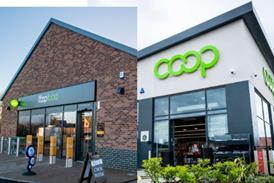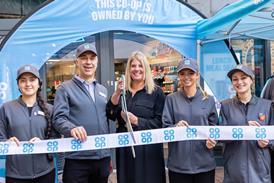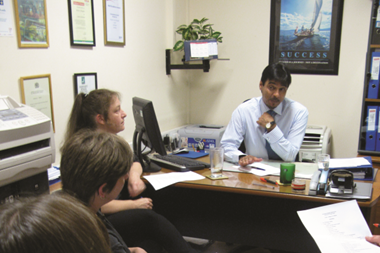Convenience store staff are put in a position of responsibility from day one of their employment, handling high volumes of cash, operating expensive equipment and dealing face to face with the bread and butter of your business – the customer.
So finding trustworthy and willing employees is essential. But that’s often easier said than done.
You may have received a promising application from a potential employee, but is that person trustworthy and hardworking? Will they work well with the rest of your team and, most importantly, do they have the right attitude to customer service?
The answers to these questions hinge on the all-important interview, so the more professional and detailed this is, the better your chance of choosing the person best suited to your business.
The most important thing to remember when carrying out an interview is to be organised, maintain control at all times, and to listen hard to responses to your questions, taking notes to remind yourself later of the strengths and weaknesses of each candidate.
You should make every effort to put the candidate at ease, so welcome them, introduce yourself and any other people present, and explain the structure the interview will take.
Outline the company background and the role up for grabs, and explain where the job fits. Encourage the candidate to talk about how their skills and experience apply to the vacancy in question.
Questions should be open-ended – what, why, how, where and who – because these can’t be answered by an unsatisfactory one-word reply. And allow the candidate time to think and speak.
Keep control of the interview and if you feel the candidate is going off-track, turn the conversation back to the information you need.
At the end of the interview, ask the candidate if they have any questions, inform them of the next stage in the recruitment process, giving estimated timescales.
A local Business Link group will be able to advise on interviewing best practice, as well as give you ideas on how to improve your existing process.
Joanne Griffin, people development advisor from business support organisation Sussex Enterprise, part of Business Link, says: “I would encourage retail owners and managers to develop their recruitment and interviewing skills further through training so that they can get recruitment and selection right the first time. Retailers are very busy people who find it difficult to get away from the business for training, so online learning may be a good option as they can access this in their own time. Learndirect offers some good online courses. However, this learning style doesn’t suit everyone and some others may prefer to take a day out for a workshop.”
Griffin adds that there are schemes available to help retailers in Sussex with the cost of training, so it’s worth checking with your local Business Link organisation.
In Sussex, for example, several European Social Fund and Learning and Skills Council funded programmes are available to help retailers develop and learn new skills.
“One such initiative is Retail Skills Plus accessed through Sussex Enterprise,” says Griffin. “It offers up to £500 towards training (max £100 per person) for retailers in six town centres across Sussex.” Visit www.sussexenterprise.co.uk for further information.
Griffin adds: “People development advisors at Sussex Enterprise or their equivalent in other areas are able to help employers find the right course to suit their learning needs and can help access any funding that might be available.”
ALTERNATIVE METHODS
A traditional interview isn’t the only way to quiz candidates. Many companies today use psychometric testing, particularly if they’re looking for people with an aptitude for specific tasks.
United Co-op uses psychometric testing to investigate potential employees’ reliability and aptitude for providing good customer service. “The aim is to recruit employees who are naturally customer service- or people-orientated, rather than recruit people based only on previous work experience,” says United Co-op Food Group head of human resources Steve Walker. “People who score well in this test stay in the business longer and are more likely to achieve high performance review scores.”
The questionnaire assesses the candidate’s ability in five key competencies needed to work well in a store environment: reliability, teamworking, relating to customers, quality orientation and using initiative.
The test works on a traffic light system. Depending on the results, candidates are given a green, amber or red status.
“Green is go for it, subject to the interview; amber is more tentative; and red is think very carefully before offering this person a job,” says Walker.
The Business Link warns that psychometric tests aren’t always a good indicator of future performance, and shouldn’t be used unless there is a proven need and a suitably qualified person to administer them.
RECRUITMENT DAYS
Recruiting for one or two new employees is tough enough, but what if you’ve got a whole new store to staff? The answer could lie in a recruitment day. Independent retailer Susie Hawkins, who runs six c-stores on forecourts in the Cheltenham and Gloucester areas, went down this route to staff her 24-hour Budgens store at Barnwood.
“We took a big ad in the local paper, which cost a fortune, but we had an amazing response,” says Susie. About 40 people were then invited to a day of interviews at a nearby hotel, where each was given a 10-15 minute slot.
“Everyone had filled out application forms so we had some idea who everyone was. It was an incredibly worthwhile day because we could have spent weeks trying to recruit that many staff. It also helped seeing everyone together because you could see how the team might gel. If the recruitment process is held over a few weeks, you can’t always remember.”
The interview slots sound short, but Susie had another plan to get the best impression of each candidate. “Someone from Budgens came to hold the interviews, along with the new site manager, while I was stayed outside, welcoming everyone. None of them knew who I was. I chatted to them as a way of getting to see what they were like outside of the formal interview situation. This way, we got an impression of each person from both sides and cross-referenced our notes afterwards.
“By the end of it we weren’t fully staffed, but were certainly well staffed,” adds Susie. “There were about 10 or 12 people who didn’t get offered jobs, but generally the calibre was very good. I think it helped having a big advert, which made quite a statement. If I had to find staff for a whole site, I would do it this way again. It was hard work but we achieved a lot.”
Top tips for interviewing
Decide on the selection methods you will use to assess whether candidates meet the job specification.
Assess all the CVs you receive in terms of how well they meet the job specification.
Initial telephone interviews are quite common and can help you shortlist candidates if you have a lot of applications.
Invite those candidates who meet the specification along to interview. Ask the candidates if they have any disabilities, and ensure that any reasonable adjustments are made so that the candidates aren’t put at a disadvantage.
Plan the interview questions in advance, according to the person specification, and use the same standard questions for each candidate. This will ensure that you cover all the areas required and will mean that all the candidates have an equal chance of showing how they would be suited to the role.
Ensure that the questions asked are necessary for the job role and can in no way be seen as discriminatory on any other basis – questions relating to marital status, children, ethnic origin and so on should be avoided.
Where possible, two or more people should be involved in the interview process. This will help to ensure that all information is taken in and will help prevent bias.
Notes should be taken of every interview, which can be used at the end of the process as reminders of the answers each candidate gave, how they were presented, and any comments about personality that may be relevant. These notes should then be used to assess the best candidate for the position.
Be aware that interview notes can be requested by a tribunal if a candidate feels that they were unfairly treated, or believe that they were not selected for reasons other than not being the best match for the job specification. The interview notes may also be requested directly by the candidate under Data Protection Act regulations. Make sure that any notes made do not hold any information of a discriminatory nature or otherwise that you wouldn't like to have viewed by the public domain.
Any offer made to a candidate should be confirmed in writing. This would prevent any confusion as to exactly what has been agreed. Both oral and written offers can form part of the employment contract.
Other candidates who attended the interview should be informed in writing that they have not been successful, unless you have specified in your advert that unsuccessful candidates can assume they have been unsuccessful after a given period of time. Do not discard reserve candidates until the selected candidate has accepted the position.
Feedback should be given to candidates if requested. It should be based on the interview notes and a record of any feedback given kept on file.
Source: Retail Academy
So finding trustworthy and willing employees is essential. But that’s often easier said than done.
You may have received a promising application from a potential employee, but is that person trustworthy and hardworking? Will they work well with the rest of your team and, most importantly, do they have the right attitude to customer service?
The answers to these questions hinge on the all-important interview, so the more professional and detailed this is, the better your chance of choosing the person best suited to your business.
The most important thing to remember when carrying out an interview is to be organised, maintain control at all times, and to listen hard to responses to your questions, taking notes to remind yourself later of the strengths and weaknesses of each candidate.
You should make every effort to put the candidate at ease, so welcome them, introduce yourself and any other people present, and explain the structure the interview will take.
Outline the company background and the role up for grabs, and explain where the job fits. Encourage the candidate to talk about how their skills and experience apply to the vacancy in question.
Questions should be open-ended – what, why, how, where and who – because these can’t be answered by an unsatisfactory one-word reply. And allow the candidate time to think and speak.
Keep control of the interview and if you feel the candidate is going off-track, turn the conversation back to the information you need.
At the end of the interview, ask the candidate if they have any questions, inform them of the next stage in the recruitment process, giving estimated timescales.
A local Business Link group will be able to advise on interviewing best practice, as well as give you ideas on how to improve your existing process.
Joanne Griffin, people development advisor from business support organisation Sussex Enterprise, part of Business Link, says: “I would encourage retail owners and managers to develop their recruitment and interviewing skills further through training so that they can get recruitment and selection right the first time. Retailers are very busy people who find it difficult to get away from the business for training, so online learning may be a good option as they can access this in their own time. Learndirect offers some good online courses. However, this learning style doesn’t suit everyone and some others may prefer to take a day out for a workshop.”
Griffin adds that there are schemes available to help retailers in Sussex with the cost of training, so it’s worth checking with your local Business Link organisation.
In Sussex, for example, several European Social Fund and Learning and Skills Council funded programmes are available to help retailers develop and learn new skills.
“One such initiative is Retail Skills Plus accessed through Sussex Enterprise,” says Griffin. “It offers up to £500 towards training (max £100 per person) for retailers in six town centres across Sussex.” Visit www.sussexenterprise.co.uk for further information.
Griffin adds: “People development advisors at Sussex Enterprise or their equivalent in other areas are able to help employers find the right course to suit their learning needs and can help access any funding that might be available.”
ALTERNATIVE METHODS
A traditional interview isn’t the only way to quiz candidates. Many companies today use psychometric testing, particularly if they’re looking for people with an aptitude for specific tasks.
United Co-op uses psychometric testing to investigate potential employees’ reliability and aptitude for providing good customer service. “The aim is to recruit employees who are naturally customer service- or people-orientated, rather than recruit people based only on previous work experience,” says United Co-op Food Group head of human resources Steve Walker. “People who score well in this test stay in the business longer and are more likely to achieve high performance review scores.”
The questionnaire assesses the candidate’s ability in five key competencies needed to work well in a store environment: reliability, teamworking, relating to customers, quality orientation and using initiative.
The test works on a traffic light system. Depending on the results, candidates are given a green, amber or red status.
“Green is go for it, subject to the interview; amber is more tentative; and red is think very carefully before offering this person a job,” says Walker.
The Business Link warns that psychometric tests aren’t always a good indicator of future performance, and shouldn’t be used unless there is a proven need and a suitably qualified person to administer them.
RECRUITMENT DAYS
Recruiting for one or two new employees is tough enough, but what if you’ve got a whole new store to staff? The answer could lie in a recruitment day. Independent retailer Susie Hawkins, who runs six c-stores on forecourts in the Cheltenham and Gloucester areas, went down this route to staff her 24-hour Budgens store at Barnwood.
“We took a big ad in the local paper, which cost a fortune, but we had an amazing response,” says Susie. About 40 people were then invited to a day of interviews at a nearby hotel, where each was given a 10-15 minute slot.
“Everyone had filled out application forms so we had some idea who everyone was. It was an incredibly worthwhile day because we could have spent weeks trying to recruit that many staff. It also helped seeing everyone together because you could see how the team might gel. If the recruitment process is held over a few weeks, you can’t always remember.”
The interview slots sound short, but Susie had another plan to get the best impression of each candidate. “Someone from Budgens came to hold the interviews, along with the new site manager, while I was stayed outside, welcoming everyone. None of them knew who I was. I chatted to them as a way of getting to see what they were like outside of the formal interview situation. This way, we got an impression of each person from both sides and cross-referenced our notes afterwards.
“By the end of it we weren’t fully staffed, but were certainly well staffed,” adds Susie. “There were about 10 or 12 people who didn’t get offered jobs, but generally the calibre was very good. I think it helped having a big advert, which made quite a statement. If I had to find staff for a whole site, I would do it this way again. It was hard work but we achieved a lot.”
Top tips for interviewing
Decide on the selection methods you will use to assess whether candidates meet the job specification.
Assess all the CVs you receive in terms of how well they meet the job specification.
Initial telephone interviews are quite common and can help you shortlist candidates if you have a lot of applications.
Invite those candidates who meet the specification along to interview. Ask the candidates if they have any disabilities, and ensure that any reasonable adjustments are made so that the candidates aren’t put at a disadvantage.
Plan the interview questions in advance, according to the person specification, and use the same standard questions for each candidate. This will ensure that you cover all the areas required and will mean that all the candidates have an equal chance of showing how they would be suited to the role.
Ensure that the questions asked are necessary for the job role and can in no way be seen as discriminatory on any other basis – questions relating to marital status, children, ethnic origin and so on should be avoided.
Where possible, two or more people should be involved in the interview process. This will help to ensure that all information is taken in and will help prevent bias.
Notes should be taken of every interview, which can be used at the end of the process as reminders of the answers each candidate gave, how they were presented, and any comments about personality that may be relevant. These notes should then be used to assess the best candidate for the position.
Be aware that interview notes can be requested by a tribunal if a candidate feels that they were unfairly treated, or believe that they were not selected for reasons other than not being the best match for the job specification. The interview notes may also be requested directly by the candidate under Data Protection Act regulations. Make sure that any notes made do not hold any information of a discriminatory nature or otherwise that you wouldn't like to have viewed by the public domain.
Any offer made to a candidate should be confirmed in writing. This would prevent any confusion as to exactly what has been agreed. Both oral and written offers can form part of the employment contract.
Other candidates who attended the interview should be informed in writing that they have not been successful, unless you have specified in your advert that unsuccessful candidates can assume they have been unsuccessful after a given period of time. Do not discard reserve candidates until the selected candidate has accepted the position.
Feedback should be given to candidates if requested. It should be based on the interview notes and a record of any feedback given kept on file.
Source: Retail Academy



























No comments yet